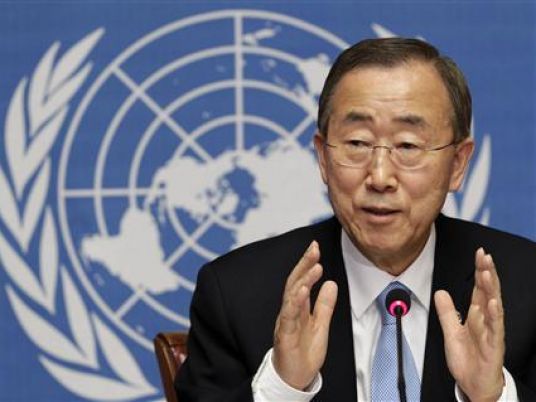
Syria's government and its enemies come face to face on Wednesday for the first time as world powers try to set aside their own differences and push for an end to three years of civil war that is unsettling the entire Middle East.
A day of formal speeches under UN auspices at a hotel on Lake Geneva has raised no great expectations, particularly among Islamist rebels on Syria's frontlines who have branded Western-backed opposition leaders as traitors for even agreeing to be in the same room as President Bashar al-Assad's delegates.
A flap over a now withdrawn last-minute invitation to Iran, Assad's main ally, highlighted tensions between the West andRussia and the sectarian rift in the Middle East between Sunni Arabs who support the rebels and the Shi'ite rulers in Tehran.
The release on the eve of the talks of thousands of photographs apparently showing prisoners tortured and killed by the government reinforced opposition demands that Assad must quit and face a war crimes trial. The president, who succeeded his father 14 years ago, insists he can win re-election and wants to talk about fighting "terrorism."
Syrian Foreign Minister Walid al-Moualem rejected any discussion of Assad's future. "The subject of the president and the regime is a red line for us and the Syrian people and will not be touched," Moualem, who will lead the Damascus delegation, was quoted by Syria's SANA news agency as saying.
Assad has been protected by Russia, his main arms supplier, which dislikes Western attempts to overthrow incumbent leaders.
But Washington and Moscow share alarm at the spread of the violence that has already killed more than 130,000 Syrians. Having set aside their differences last year to co-sponsor the talks that are finally getting under way, Russia and the United States profess an urgent common goal of halting the bloodshed.
Presidents Vladimir Putin and Barack Obama had a "businesslike" conversation on the issue by phone on Tuesday, while Russian Foreign Minister Sergei Lavrov met US Secretary of State John Kerry in Montreux, where the talks will be held.
"It is hard to have expectations at the back of all this," said a source at the talks who has advised the opposition. "But Moscow and Washington are genuine on ending the conflict. They are sincere and this meeting is not for show."
CONFERENCE AGENDA
United Nations mediator Lakhdar Brahimi hopes Wednesday's first day at Montreux's Palace Hotel can lead to detailed discussions down the lake in Geneva from Friday. U.N. diplomats believe the talks could initially bring at least some relief for Syrian civilians, by improving aid flows, as well as setting up prisoner exchanges.
Assad's representatives may highlight the threat to the West and its Arab allies from al Qaeda and other militants fighting his forces. But Western leaders say they fully back opposition demands that Assad step down, something they say was the conclusion of a UN conference in Geneva 18 months ago.
Russia endorsed that communique but has disagreed with Western powers which say that, by calling for a transitional government in Damascus, the meeting known as Geneva 1 made Assad's removal a condition for a peace settlement.
As Western governments were able to cajole the opposition National Coalition into attending the talks, known as Geneva 2, so Russia may be in a position to pressure Assad to make some concessions. But, the opposition adviser cautioned, "Assad won't commit suicide because Moscow asks him to."
Neither side in Syria has either appeared able to complete a victory. Though much divides the rebels, who have been fighting among themselves, they are united in wanting Assad out. So reaching a settlement that satisfies both sides seems a distant prospect.
REVOLT AND WAR
Discontent stretches back to the rule since 1970 of Assad's father, who took power in a military coup, but it boiled over in March 2011 as Syria's drought-hit economy struggled and the Arab Spring uprisings in Tunisia and Egypt inspired protests.
When those were crushed, the revolt became a war that has taken on an increasingly sectarian complexion, setting majority Sunnis against Assad's Alawite community, an offshoot of Shiite Islam. It has also drawn in rival powers with Saudi Arabia and Qatar backing the rebels and Iran standing by Assad.
Al Qaeda-linked militants and other Islamists have emerged as the most powerful forces on the rebel side, dampening Western appetite for direct intervention. Iran and its Lebanese Shi'ite ally Hezbollah have helped Assad. And violence has spread, notably to neighboringIraq and Lebanon.
Wednesday's conference is due to start at 9 a.m. (0800 GMT) and will feature speeches by UN Secretary-General Ban Ki-moon, Kerry and Lavrov before those from the Syrian delegates – first the government, then the opposition led by Ahmed Jarba.
Ministers from other nations involved in arranging the talks will also take the floor and officials expect presentations to last until early evening.
For all the low expectations on Lake Geneva, millions of Syrians in refugee camps hope something will change. "Let them please find a solution for this problem," Mohammed from Homs said at a UN centre in Lebanon. "Let us go home."




